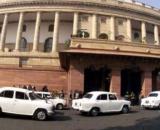 New Delhi, Dec 13: The amended Lokpal, which delinks the setting up of Lokayuktas in the states and transfers the powers of sanction of prosecution against public servant to the ombudsman, was brought for consideration in Rajya Sabha today amid din.
New Delhi, Dec 13: The amended Lokpal, which delinks the setting up of Lokayuktas in the states and transfers the powers of sanction of prosecution against public servant to the ombudsman, was brought for consideration in Rajya Sabha today amid din.
Tabling the amended bill, Minister of State for Personnel V Narayanasamy sought the cooperation of the House in its passage.
However, the bill could not be taken up for consideration as the House was not in order with members from SP and TDP shouting slogans in the Well against price rise and bifurcation of Andhra Pradesh respectively.
Members from BJP, Trinamool Congress and others complained that nothing was audible in the din and the House should first be brought in order.
Ravishankar Prasad (BJP) urged Deputy Chairman P J Kurien to restore normalcy in the House as it was an important issue, while Derek O'Brien was seen gesturing that he was unable to hear anything.
As the din continued, the discussion on the bill could not take place as the Chair adjourned the House till 2.30 PM.
On January 31 this year, the government had amended the controversial Lokpal Bill, delinking it from the setting up of Lokayuktas in the states and transferring powers of sanction of prosecution against public servant to the ombudsman.
The Union Cabinet had accepted 14 of the 16 recommendations made by the Rajya Sabha Select Committee, which was set up in May last year amid sharp differences among political parties because of which the legislation remained stuck in the Upper House since December 2011.
The bill has been hanging in balance since then. After getting a nod from the Upper House, the bill with amendments will go back for fresh approval to Lok Sabha where it has already been passed.
The government, however, did not accept a recommendation wherein an accused public servant would get no chance to present his view before preliminary inquiry is initiated.
It also did not accept the recommendation that transfer of CBI officers assigned by Lokpal to investigate a case cannot be transferred without the approval of the anti-graft watchdog, saying it will affect the smooth functioning of CBI.
BJP demanded that the government should drop the two amendments on which there is disagreement. Government is opposed to the amendment which states that the Lokpal should be consulted before a CBI officer probing a case is transferred.
While the Opposition maintains this will check undue interference of the government, the government insists it has the right to post and transfer officials.
The other amendment on which there is no agreement between the government and Opposition is on search and seizure of an official's property. Government maintains he should be given show cause notice first when a charge of disproportionate assets is made against him while the Opposition says it will take away the element of suddenness and surprise and alert the person.
Among the recommendations accepted by the government is the one about delinking Lokayukta from the Lokpal Bill, an issue which was one of the most controversial provisions with several parties contending that it amounts to the central government encroaching upon the rights of the states.
The select committee had recommended that the state governments will have to set up Lokayuktas within one year of enactment of Lokpal.
The bill will have the provision of appointment of CBI Director by a three-member collegium comprising the Prime Minister, Leader of the Opposition in Lok Sabha and the Chief Justice of India.
The government accepted the recommendation of the committee that the power to grant sanction for prosecution of public servants could be shifted to Lokpal in place of the government.
It also agreed with the recommendation that Lokpal may be required to seek comments of the competent authority and the public servant before taking such a decision.
The Rajya Sabha panel had recommended exclusion of bodies and institutions receiving donations from the public from the purview of Lokpal.
Since bodies receiving donations from the public were also covered in the original Lokpal Bill, the government has not accepted the recommendation.
But the government had at the same time decided to exempt only bodies or authorities established under a central or state act providing for administration of public, religious or charitable trusts registered under Societies Registration Act.
The panel had recommended that seeking of comments from public servant during preliminary enquiry should not be mandatory.
But the government felt that providing an opportunity to public servant and to the government at that stage would help clear doubts in several cases and would substantially reduce the number of cases going for regular investigation.






Comments
Add new comment